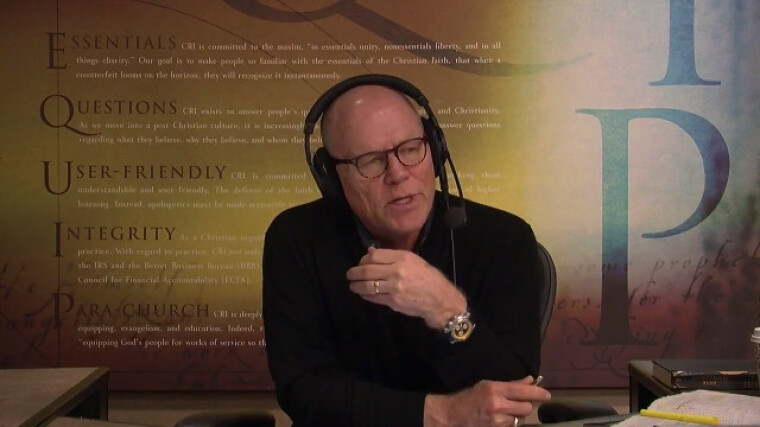Hank Hanegraaff says his departure from evangelicalism was spurred by watching 'pastor-preneurs'

Hank Hanegraaff, popularly known as the "Bible Answer Man," said that watching pastors who act more like entrepreneurs were part of the reason for his departure from evangelicalism.
In an interview with NPR's Charlotte affiliate WFAE on Wednesday, Hanegraaff said that people jumped to the wrong conclusions when he joined the St. Nektarios Greek Orthodox church in south Charlotte in April, with some suggesting that he "walked away from the faith."
The radio host said that was not the case at all, and he spoke about the type of "pastor-preneur" church leadership that he says made him uncomfortable.
"Where the pastor is like an entrepreneur, branding, formulaically getting people into seats — that became troubling to me and I decided I was going to explore," he said.
Hanegraaff, who is undergoing chemotherapy for a rare form of cancer called mantle cell lymphoma, had stated that he felt drawn to the days of the early Church after he witnessed the simplicity and passion of Chinese Christians. He went on to study the concept of theosis, which was a teaching of the Eastern Orthodox Church regarding union with God. However, the radio host maintained his theological beliefs remain mostly unchanged.
Following his conversion, the Winston-Salem-based Truth Network and Bott Radio Network (BRN) pulled his radio broadcast from their stations.
"We want to make sure that our listeners know that the programming that we have on Bott Radio Network is thoroughly biblical," said BRN President Richard P. Bott II at the time.
The radio host said that he is not too concerned about the stations that have stopped broadcasting his show.
"I've seen over the years that God closes one door and He opens other doors. For example, we're now on the Orthodox Christian Network. For me this is not a popularity contest or the size of the platform; it is simply doing what God leads me to do. Let the chips fall where they may," he said.
Several prominent evangelical figures have expressed concerns about Hanegraaff's decision to join the Orthodox church.
R. Philip Roberts, director for international theological education with the Global Ministries Foundation in Tennessee, noted that the roots of Eastern Orthodox go back centuries. But he warned that there are problems with its teaching because there had been changes in its interpretations of biblical doctrines over the years.
He went on to explain that while it has roots in the ancient church, its ceremonies and theology have developed gradually throughout the centuries.
Roberts asserted that Hanegraaff likely accepted a Western version of Orthodoxy, interpreted through an evangelical lens. He added that he cannot understand how the radio host can endorse a denomination that currently teaches unbiblical doctrines and ceremonies, while also persecuting evangelicals in some places like Russia and elsewhere in Eastern Europe.
 Christians don't have to affirm transgenderism, but they can’t express that view at work: tribunal
Christians don't have to affirm transgenderism, but they can’t express that view at work: tribunal Archaeology discovery: Medieval Christian prayer beads found on Holy Island
Archaeology discovery: Medieval Christian prayer beads found on Holy Island Presbyterian Church in America votes to leave National Association of Evangelicals
Presbyterian Church in America votes to leave National Association of Evangelicals Over 50 killed in 'vile and satanic' attack at Nigerian church on Pentecost Sunday
Over 50 killed in 'vile and satanic' attack at Nigerian church on Pentecost Sunday Ukrainian Orthodox Church severs ties with Moscow over Patriarch Kirill's support for Putin's war
Ukrainian Orthodox Church severs ties with Moscow over Patriarch Kirill's support for Putin's war Islamic State kills 20 Nigerian Christians as revenge for US airstrike
Islamic State kills 20 Nigerian Christians as revenge for US airstrike Man who served 33 years in prison for murder leads inmates to Christ
Man who served 33 years in prison for murder leads inmates to Christ


 Nigerian student beaten to death, body burned over ‘blasphemous’ WhatsApp message
Nigerian student beaten to death, body burned over ‘blasphemous’ WhatsApp message 'A new low': World reacts after Hong Kong arrests 90-year-old Cardinal Joseph Zen
'A new low': World reacts after Hong Kong arrests 90-year-old Cardinal Joseph Zen Iran sentences Christian man to 10 years in prison for hosting house church worship gathering
Iran sentences Christian man to 10 years in prison for hosting house church worship gathering French Guyana: Pastor shot dead, church set on fire after meeting delegation of Evangelicals
French Guyana: Pastor shot dead, church set on fire after meeting delegation of Evangelicals ‘Talking Jesus’ report finds only 6% of UK adults identify as practicing Christians
‘Talking Jesus’ report finds only 6% of UK adults identify as practicing Christians Mission Eurasia ministry center blown up in Ukraine, hundreds of Bibles destroyed: 'God will provide'
Mission Eurasia ministry center blown up in Ukraine, hundreds of Bibles destroyed: 'God will provide' Church holds service for first time after ISIS desecrated it 8 years ago
Church holds service for first time after ISIS desecrated it 8 years ago Burger King apologizes for 'offensive campaign' using Jesus' words at the Last Supper
Burger King apologizes for 'offensive campaign' using Jesus' words at the Last Supper Uganda: Muslims abduct teacher, burn him inside mosque for praying in Christ’s name
Uganda: Muslims abduct teacher, burn him inside mosque for praying in Christ’s name